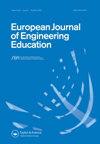Capturing student feedback literacy using reflective logs
IF 2.8
Q2 EDUCATION & EDUCATIONAL RESEARCH
引用次数: 2
Abstract
ABSTRACT First-year university students are confronted with a different culture of feedback than they were used to in secondary education. Since the emphasis at university is mainly on independent learning, students need to fulfil the role of a self-regulated learner and need to develop feedback literacy to make use of the multitude of feedback opportunities. In this study, reflective logs were used to capture first-year engineering students’ most impactful feedback experiences. It was demonstrated that reflective logs are a valuable instrument to provide insight into students’ feedback literacy. Moreover, a significant association between the reflection level and the presence of the different feedback literacy characteristics was found. Although most of the students acknowledge the basic understandings of feedback, only about half of the reflective logs point to a more advanced use of feedback opportunities. The lack of some specific characteristics suggest that students behold a teacher-centred view of feedback. Therefore, it is important to explicitly introduce them to the contemporary learner-centred definitions of feedback so that they can recognise the variety of feedback opportunities. The study further endorses that developing reflective skills can be an important precursor to feedback literacy.使用反思日志获取学生的反馈素养
大学一年级的学生面临着一种不同于他们在中学教育中所习惯的反馈文化。由于大学主要强调的是自主学习,学生需要发挥自我调节学习者的作用,需要培养反馈素养,以利用大量的反馈机会。在这项研究中,反思日志被用来捕捉一年级工程专业学生最具影响力的反馈经验。研究表明,反思日志是一种有价值的工具,可以深入了解学生的反馈素养。此外,反思水平与不同反馈素养特征的存在之间存在显著关联。尽管大多数学生承认对反馈的基本理解,但只有大约一半的反思日志指出了对反馈机会的更高级利用。缺乏一些具体的特征表明,学生看到的是一种以教师为中心的反馈观点。因此,明确地向他们介绍当代以学习者为中心的反馈定义是很重要的,这样他们就能认识到反馈机会的多样性。这项研究进一步证实,培养反思技能可能是反馈素养的重要先导。
本文章由计算机程序翻译,如有差异,请以英文原文为准。
求助全文
约1分钟内获得全文
求助全文
来源期刊

European Journal of Engineering Education
EDUCATION & EDUCATIONAL RESEARCH-
CiteScore
7.30
自引率
13.00%
发文量
64
期刊介绍:
European Journal of Engineering Education is published six times a year in print and electronic editions and provides an essential forum for dialogue between researchers and specialists in the field of engineering education, at European and worldwide levels. European Journal of Engineering Education is the Official Journal of SEFI, the Socièté Européenne pour la Formation des Ingénieurs (the European Society for Engineering Education). SEFI is a non-governmental organization whose aims are to develop information about engineering education, to improve communication and exchange between professors, researchers and students and to promote cooperation between the various institutions concerned with engineering education.
 求助内容:
求助内容: 应助结果提醒方式:
应助结果提醒方式:


